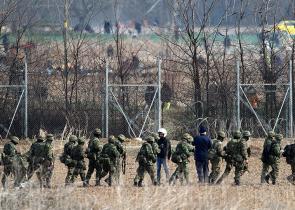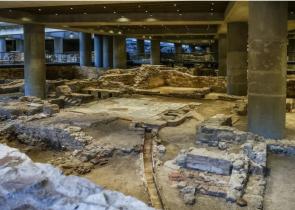"The European perspective of the Western Balkans is an issue of the utmost importance for Greek diplomacy," Foreign Minister George Gerapetritis said on Wednesday, in a keynote speech at the international conference on the topic organised by the Hellenic Foundation for European and Foreign Policy (ELIAMEP), in collaboration with the think tanks Wilfried Martens Centre for European Studies and the Hanns-Seidel Stiftung.
Gerapetritis pointed out that Greece had taken the lead in this area 20 years ago by promoting the Thessaloniki Agenda, which expressly stated that the future of the Western Balkans lies in the EU.
"We did this in very complex circumstances, at a time when the Balkans were associated with armed conflicts and ethnic clashes, political instability and economic decline. They had not yet gotten past their pre-WWI designation as the 'powder-keg of Europe'. We have to change this view," he said.
"Greece steadfastly and tangibly supports the European integration of the Western Balkans, among others in the context of the current discussion with our partners in the EU on enlargement," the minister stressed.
He also warned of new economic powers emerging in Asia, Africa and the Middle East, adding that destabising, bad faith actors were seeking to exploit the disruption and chronic problems of the region to increase their influence in the Balkans at a time when Russia's invasion of Ukraine had created a "new geopolitical reality".
This, he underlined, made it imperative "to fulfill the promise of the Thessaloniki Agenda", adding that a strong, resilient EU free of exclusions would be the cornerstone for the peace and prosperity of European citizens.
He called for a revitalisation of the enlargement process, designed to incorporate the Western Balkans but also Ukraine and Moldova in the EU, pointing out that this was the central message of the Athens Summit declaration on August 21, when the Greek prime minister gathered the leaders of the above countries to meet with the presidents of the European Commission and the European Council to promote the European perspective of this region.
At the same time, Gerapetritis clarified, "we cannot accept candidate countries that do not meet the accession criteria and especially the [EU's] basic principles ...such as democracy and the rule of law." Cases such as that of the recently elected mayor of Himare, Fredi Beleri, showed that "these principles have not yet been adopted by all countries," he noted, adding that Albania must "prove that it respects the rights of the Greek ethnic minority and the rule of law."
Gerapetritis said that Greece intends to bring the spirit of the Thessaloniki Agenda to the discussion that is about to begin on EU enlargement, with initiatives and support of all proposals that aim to revitalise the enlargement process and make it more specific and reliable, ensuring a sincere commitment from all sides and a clear time frame for accession.
He also stated Greece's commitment to enhancing network connectibility between Balkan countries and between the Balkans and the EU, as well as to improving the daily life of citizens to bring regional communities and economies closer to the EU.
The minister additionally referred to the vital energy sector and action taken by Greece to reduce regional and European dependence on Russian natural gas, while highlighting the importance of regional cooperation for protecting the environment and dealing with the climate crisis.
"As the oldest EU Member-State in the region, it is our duty to guide the Western Balkans in their course toward Europe," he said, adding that this was the safest and most certain path toward peace, stability and prosperity for the countries in the region and the EU.
Ursula von der Leyen: Greece and Spain struck by ravaging wildfires and floods
Greece could mobilise up to 2.25 billion euros in aid for floods and fires, von der Leyen says
Ακολουθήστε το Lykavitos.gr στο Google News
και μάθετε πρώτοι όλες τις ειδήσεις





